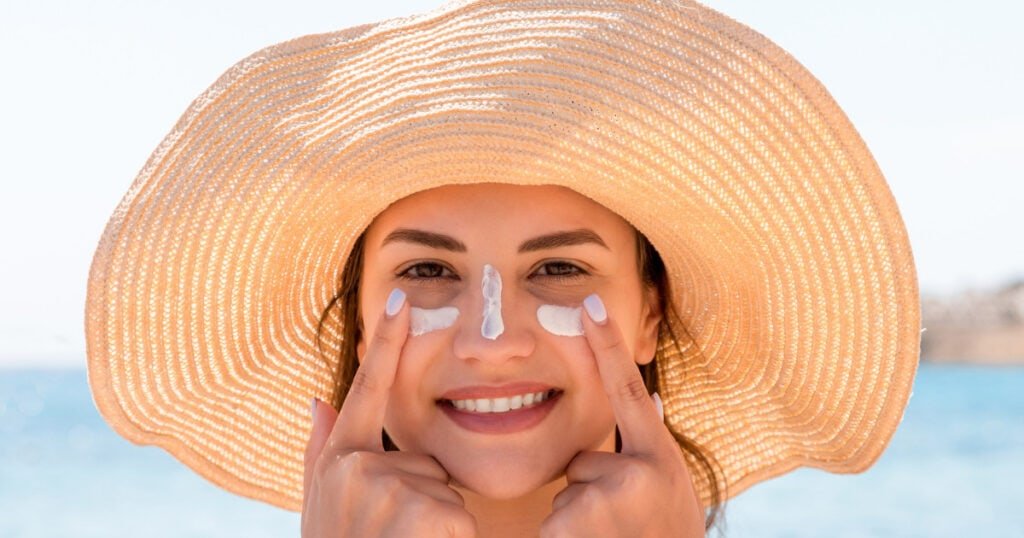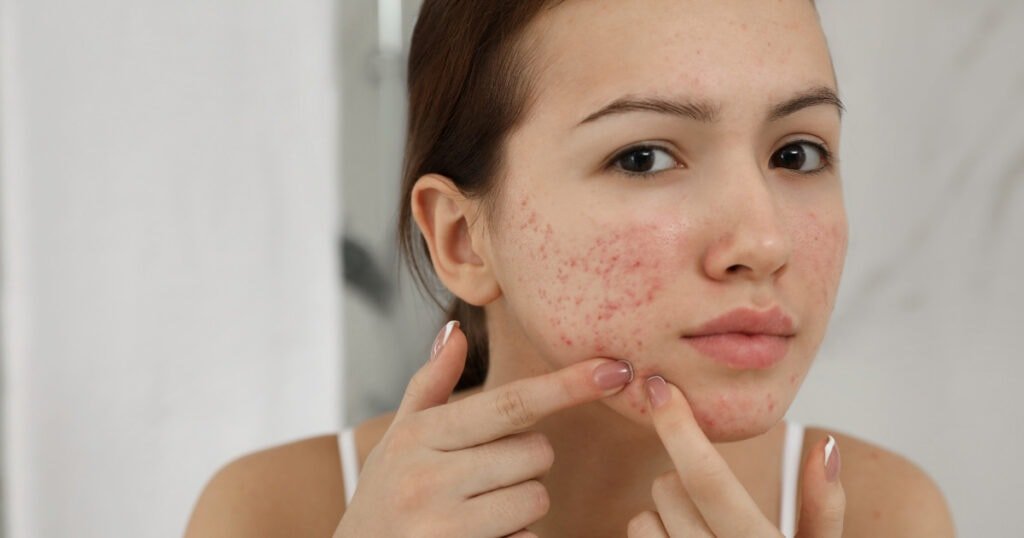Do you suffer from acne? If so, you’re not alone. Over 80% of teenagers and young adults are affected by this skin condition.

But your sunscreen could be the culprit? That’s right—sunscreen has been linked to acne breakouts in some people.
This article explores the connection between sunscreen and acne, discusses how to choose an acne-friendly formula, and provides tips for avoiding flare-ups while protecting your skin from harmful UV rays.
The connection between Sunscreen and Acne
Wearing protection from the sun may seem like a good idea, but it could be linked to skin breakouts.
Sunscreens are topical agents applied to the skin to block ultraviolet (UV) radiation from the sun and other sources of light.
While there is no scientific evidence that sunscreen directly causes acne, some types of sunscreen can trigger or worsen existing acne.
In particular, non-comedogenic sunscreens are recommended for those with sensitive or acne-prone skin because they don’t clog pores and contribute to breakouts.
It’s essential to note that some people with such skin still experience problems with certain sunscreens due to allergies or other sensitivities.
Therefore, it’s important to experiment with different brands and formulations until you find one that meets your needs.
Ingredients and Clogged Pores
The key thing to consider regarding clogged pores is what ingredients are in your skincare products — they can make a big difference!
Pores clog when dead skin cells, oil, and bacteria become trapped in the hair follicles on our skin.
Many people with acne-prone skin are concerned that their sunscreen could contribute to their blemishes and outbreaks. However, while some sunscreens can contain comedogenic ingredients that may contribute to clogged pores, many formulas today include non-comedogenic ingredients specifically designed for acne-prone skin.
It’s important to research the ingredients in sunscreen before purchasing. Sunscreen products can vary dramatically regarding active ingredients, base components, thicknesses, and textures.
Make sure you look for formulas with zinc oxide or titanium dioxide, which don’t typically cause breakouts, or those labeled as “non-comedogenic” or “oil-free,” which means they won’t contribute to clogging up your pores.
Avoid sunscreens containing fragrances, oils, or other pore-clogging agents like lanolin and mineral oil if you’re looking for an acne-safe option.

Choosing Acne-friendly Sunscreen
Keeping your skin clear and blemish-free can be as simple as choosing the right sun protection. When looking for a sunscreen for acne, it’s important to avoid formulas containing comedogenic ingredients known to clog pores and cause breakouts. Instead of choosing a product with these ingredients, opt for one labeled ‘non-comedogenic’ or ‘oil-free.’
Many types of sunscreens are available, including mineral-based formulas that have zinc oxide or titanium dioxide, which create a barrier on the skin and protect it from UVA/UVB rays without blocking pores. Additionally, chemical-based options use organic compounds like oxybenzone and octinoxate to absorb UV radiation before it penetrates the skin.
All sunscreen products should have an SPF rating indicating their strength at preventing sunburns caused by UVB rays; higher ratings offer more protection but can also be thicker in texture and harder to rub into the skin. Acne-friendly sunscreen should also include moisturizing ingredients like hyaluronic acid or glycerin to keep skin hydrated while avoiding greasy residue that could lead to pimples.
Best Sunscreen for Acne-prone Skin
Protecting your skin from the sun rays doesn’t have to mean risking breakouts – there are plenty of options for those with acne-prone skin!
When choosing a sunscreen, it’s important to consider its level of protection, whether it’s chemical or mineral based, and if it has any known ingredients that could aggravate acne.
To get the best protection and reduce the risk of breakouts, opt for sunscreens formulated specifically for acne-prone skin.
Chemical sunscreens contain active ingredients like avobenzone and oxybenzone that absorb UV radiation from the sun. These offer broad-spectrum protection from UVA and UVB rays but can sometimes cause irritation or worsen existing acne due to their potential clogging effects on pores.
Mineral (or physical) sunscreens are made with zinc oxide or titanium dioxide, creating a barrier on top of your skin’s surface that reflects away UV radiation without being absorbed into pores. This makes them less likely to cause breakouts than chemical sunscreens, but their effectiveness may vary by brand.
If you have sensitive skin, look for mineral-based sunscreens designed for acne-prone skin. These often contain non-comedogenic ingredients like zinc oxide and dimethicone, which help protect against breakouts while providing effective protection against the sun’s damaging rays.

Using Sunscreen without Aggravating Acne
Applying the wrong type of sunscreen can leave your skin unprotected from the sun’s damaging rays and potentially worsen existing breakouts.
Acne-prone skin needs to be treated with special care and caution regarding sunscreen selection.
Physical sunscreens are generally considered better for acne-prone skin than chemical sunscreens, as they are less likely to clog pores.
Physical sunscreens contain active mineral ingredients like zinc oxide or titanium dioxide, which create a barrier on the skin’s surface that reflects UV rays away from the body.
Chemical sunscreens absorb UV radiation before it reaches the skin and can cause irritation in those with acne-prone skin due to their comedogenic properties.
When selecting a sunscreen, look for one specifically formulated for sensitive or oily/acne-prone skin types.
Opt for an oil-free option that contains non-comedogenic ingredients like zinc oxide, titanium dioxide, or avobenzone. Avoid products containing heavy oils or fragrances that may aggravate existing breakouts.
Additionally, apply your sunscreen 20 minutes before going outside; this will allow time for any potential irritants in the product to be absorbed into your skin without being exposed to direct sunlight, which could further exacerbate irritation and inflammation associated with acne.
Balancing Sun Protection and Acne Prevention
Now that you understand how to use sunscreen without aggravating acne, finding a balance between sun protection and acne prevention is important. For people prone to breakouts, finding the perfect way to protect them from sun damage and acne can be tricky.
The first step in balancing sun protection and acne prevention is to select an oil-free sunscreen specifically designed for acne-prone skin. Oil-free formulations will not clog pores or cause further breakouts.
Also, look for formulas with ingredients like zinc oxide, titanium dioxide, or avobenzone which provide broad-spectrum UVA/UVB protection against harmful UV rays that can cause sunburns and premature skin aging.
Additionally, ensure your chosen sunscreen has an SPF rating of at least 30 to get the maximum amount of protection from the sun’s rays while keeping your skin clear of breakouts.

Tips for Avoiding Acne Flare-ups
You can keep your skin clear by following simple tips to avoid acne flare-ups.
First, when choosing a sunscreen, look for a chemical formulation that doesn’t contain extra oils or fragrances. Sunscreens that are too greasy can clog pores and lead to breakouts. Additionally, it’s important to apply sunscreen evenly and frequently; you should reapply every two hours in direct sunlight.
You should also pay attention to which ingredients are included in your other skin care products, such as moisturizers or acne treatments. Products with heavy fragrances or artificial chemicals can irritate the skin, making acne worse.
Finally, avoid touching your face throughout the day; bacteria on your hands can transfer onto the skin and cause an outbreak of new acne.
Conclusion
You’ve learned about the potential connection between sunscreen and acne. Now that you know more about ingredients, choosing the right sunscreen for your skin, and how to use it without aggravating existing acne, you can ensure you’re well-protected from the sun while still caring for your skin.
For example, a person with acne-prone skin might opt for a natural zinc oxide sunscreen that is non-comedogenic and chemical-free. You can have healthy skin all summer long by finding the right balance between sun protection and acne prevention!
